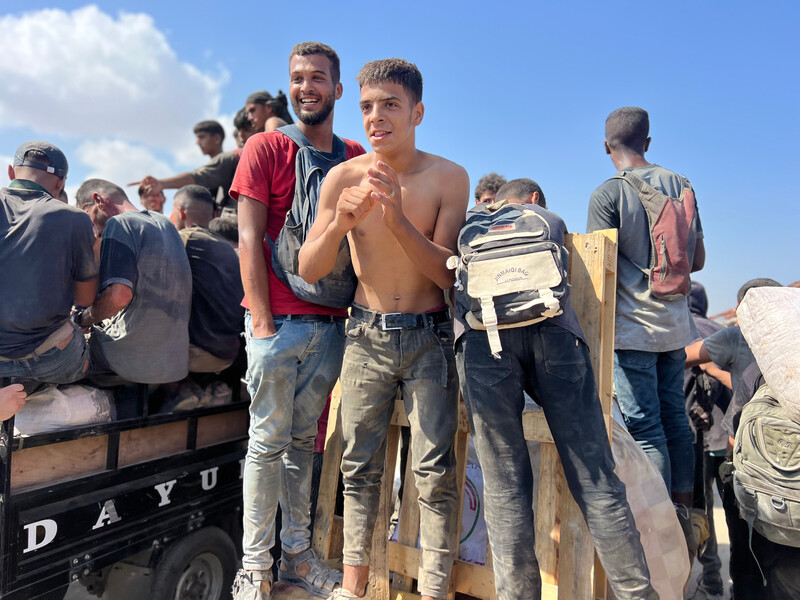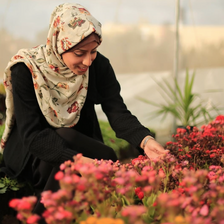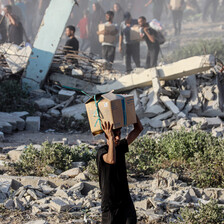The Electronic Intifada 15 August 2025

Palestinians carry aid supplies that they received from the US-backed Gaza Humanitarian Foundation in the central Gaza Strip, 3 August 2025.
APA imagesMy cousin Mahmoud Amer, 37, called Abu Ahmed, lives in Khan Younis refugee camp, west of the city, in a tent on the ruins of his house. He used to work as an electrician, but like most, he lost his job in the war.
He has lost almost 45 pounds since October 2023, and he now weighs around 110 pounds. He is extremely thin and weak, barely able to walk and no longer able to carry the gallons of water from distribution points back to his wife Tahrir and his children: Ahmed, 12, Jawad, 10, Muhammad, 7, and Wafaa, 5.
I met with him this past July at his home in Khan Younis. We sat in one of the destroyed rooms that is now the room where they light their fires for cooking.
Mahmoud sat opposite me, very tired, and told me that he has lost all focus and control over his anger. He said he is no longer able to bear this difficult reality.
He told me that he did not hesitate for a second to go to the Gaza Humanitarian Foundation centers to receive aid, even understanding that he might be killed. His children were hungry and they did not have bread. He had to go.
Here is his story in his own words.
I went to all the centers
“I went to all the centers in the southern Gaza Strip: the center at the al-Alam roundabout [in Rafah], Morag center [in Khan Younis], and al-Shakoush center [in Rafah]. When I wake up in the morning, at 7 o’clock, I think about when these centers will open, which is usually at 10 o’clock in the morning.
“I cannot say that I am a strong person – no – I am very afraid of the scenes I am living through. I leave the house and I say to my mother, pray for me to return safely.
“I go there alone, without any of my friends, because we do not want to be the reason why one of us dies. Each of us bears responsibility for his decision to go there. As a citizen, I thought that the aid center would be organized and a safe way for us as citizens [to get food], without exposing our lives to danger, but I was shocked by the reality that I saw.”
We are a flock of sheep running toward the grass
He described his experiences at the al-Shakoush and Morag centers:
“The place is very crowded, with people coming from everywhere to the distribution center. There is a road several meters wide that citizens are allowed to walk on, and on both sides there are sand barriers more than nine meters high with Israeli tanks behind them. The Israeli army shoots at citizens for no reason. Random bullets are [being fired] everywhere.
“We have to walk on that specific road even though it is not wide enough for the large numbers of people. When the army sees people walking on both sides of the road, they shoot at them.
“When the center opens, citizens run quickly to get something as the American soldiers throw food baskets on the ground and people take them on their own without anyone to organize the citizens and give each one a food basket.”
[Editor’s Note: The GHF sites are run by armed US contractors, not the US military.]
“There is great chaos, as if we are a flock of sheep running toward the grass and either we succeed in getting [the food] or not. When we reach the aid, the army starts shooting more at us so that we can empty the place. Those baskets are heavy and the food packages fall to the ground. The [Israeli] army sees us as targets and shoots at us to kill us.”
Everything in my life has changed for the worse
“Since the beginning of the opening of these centers [in May 2025], I have been going daily, and I have only succeeded in obtaining anything twice, and unfortunately, it was from people’s leftovers.
“The first time I succeeded in obtaining anything was at the aid distribution center near Morag. I went there completely desperate because I had returned every day with nothing.
“I couldn’t take any more risks because I was seeing women and men falling to the ground around me from the army’s bullets, but one time, I decided to take more risks.
“People charged the center quickly so they could get something. They were running, and I got down on the ground to crawl and collect what had fallen on the ground – some canned beans, peas and bags of lentils. I had one bag and put everything in it. People’s feet were hurting my body, but I endured for the sake of my children. I couldn’t crawl any farther and stood up so I wouldn’t suffocate under their feet.
“I spent about seven hours on this journey, covering 14 kilometers, most of which I ran to escape the random gunfire. When I returned home, my mother and wife told me that they heard the gunfire and were very worried about me.
“We are being humiliated and our dignity as human beings is not respected in these centers. There is no organization like we were accustomed to with UNRWA [UN agency for Palestine refugees]. American soldiers stand around to tell us that the [Israeli] army will advance with tanks and that we must leave. They never give us enough time to receive the aid.
“[Today] I walked a long distance under the sun to get something. I know I’m going to die, but there’s no other option. I’m forced to do this. I want my life to go back to how it was.
“Everything in my life has changed for the worse, and I don’t know how I’ll ever recover what I’ve lost. How will I overcome the scenes of death I’ve witnessed?”
Ruwaida Amer is a journalist in Gaza.





